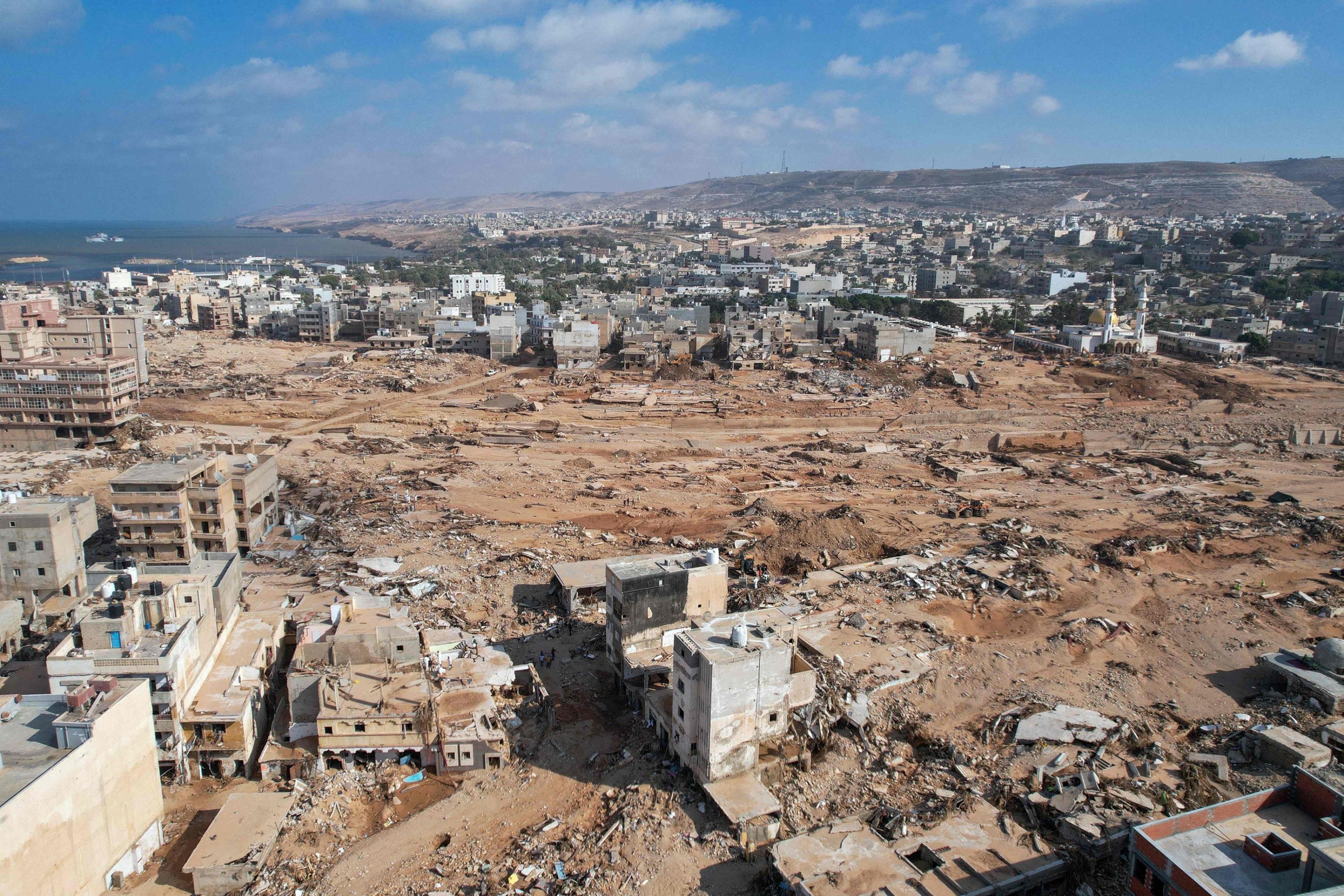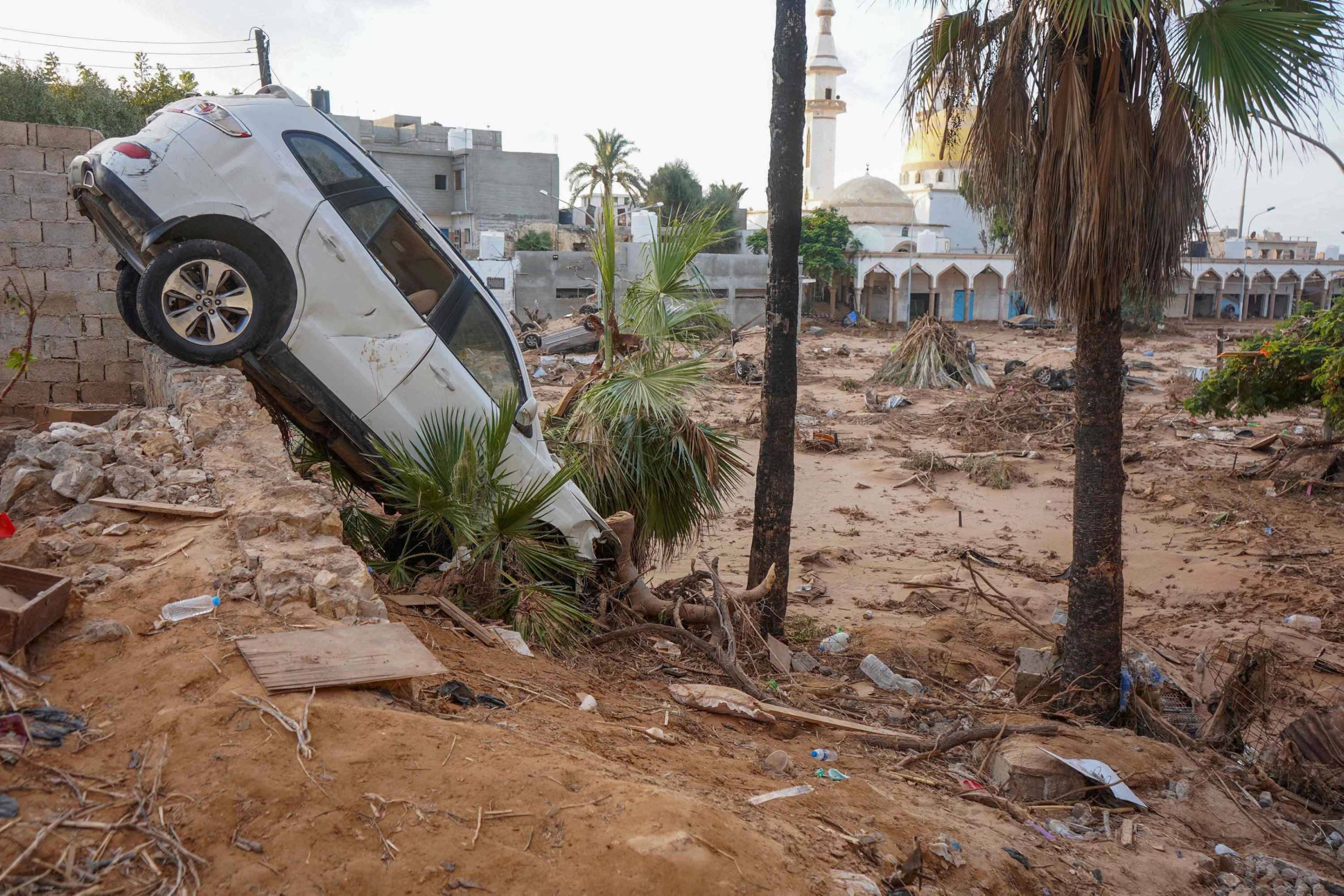© Turkuvaz Haberleşme ve Yayıncılık 2026
Over 11,300 people have now lost their lives in the apocalyptic flood that ripped through the Libyan coastal city of Derna last week, according to United Nations estimates on Sunday.
However, estimates of the number of lives lost vary widely. The most recent official death toll, from the health minister of the eastern-based administration, Othman Abdeljalil, is that 3,166 people were killed.
Citing the Libyan Red Crescent, the U.N. Office for the Coordination of Humanitarian Affairs added that another 10,100 people were still missing in the devastated city.
"These figures are expected to rise in the coming days and weeks as search-and-rescue crews work tirelessly to find survivors," the OCHA report said.
A week after a wall of water rushed through the city, the focus has now turned to caring for survivors of the disaster.
Aid is now arriving in the North African country as the world mobilizes to help emergency services cope with the aftermath of the deadly flood.
At least 40,000 people have been displaced across northeastern Libya, according to the International Organization for Migration, which cautioned the actual number is likely higher given the difficulty accessing the worst-affected areas.
Two dams upstream from Derna burst a week ago under the pressure of torrential rains from the hurricane-strength Storm Daniel.
The dams had been built to protect the port city of 100,000 people after it was hit by significant flooding in the mid-20th century.
The banks of a dried riverbed or wadi running through the city centre had been heavily built on, and last week's torrent swept everything before it as it rushed toward the Mediterranean.
A week on, bodies are still being found.
A rescue crew from Malta's Civil Protection Department discovered a beach strewn with dead bodies Friday, the Times of Malta newspaper reported.
International aid is arriving from the United Nations, Europe and the Middle East, offering some relief to the thousands of survivors.
The aid includes essential medicines and emergency surgical supplies, as well as body bags to allow corpses to be moved.
Tents, blankets, carpets, hygiene kits and food have been flown in, along with heavy machinery to help clear the debris.

The devastating flooding brought by Storm Daniel was exacerbated by poor infrastructure in Libya, which was plunged into turmoil after a NATO-backed uprising toppled and killed longtime leader Moammar Gadhafi in 2011.
Questions are being asked as to why the disaster was not prevented, when cracks in the dams have been known about since 1998.
Prosecutor General Al-Seddik al-Sour has announced an investigation into the circumstances leading to the collapse.
Like much of Libya's crumbling infrastructure, the two dams that had been built to hold back water from Derna fell into disrepair during years of neglect, conflict and division in chaos-ridden Libya.

The country is currently ruled by two rival administrations that have battled for power since Gadhafi's ousting.
With tens of thousands of people displaced, aid organizations have warned of the risks posed by leftover landmines and other unexploded ordnance, some of which the U.N. said has been shifted by floodwaters into areas previously declared clear.
The risks of water-borne diseases such as cholera are also high, according to aid groups.
Outside Derna, the flooding took an additional 170 lives, the U.N.'s report said.
The National Centre for Disease Control reported that at least 55 children were poisoned as a result of drinking polluted water in Derna.
To assist the hundreds of thousands of people in need, the U.N. has launched an appeal for more than $71 million.
"We don't know the extent of the problem," U.N. aid chief Martin Griffiths said on Friday, as he called for coordination between Libya's two rival administrations – the U.N.-backed, internationally recognized government in Tripoli, and one based in the disaster-hit east.
The scale of the devastation has prompted shows of solidarity, as volunteers in Tripoli gathered aid for the flood victims.
Survivors in Derna are glad to be alive, even as they mourn the loss of loved ones.
"In this city, every single family has been affected," said Derna resident Mohammad al-Dawali.
Seir Mohammed Seir, a member of the security forces, spoke of a three-month-old girl who lived through the tragedy in Derna.
"Her entire family died, she was the only one who survived."
